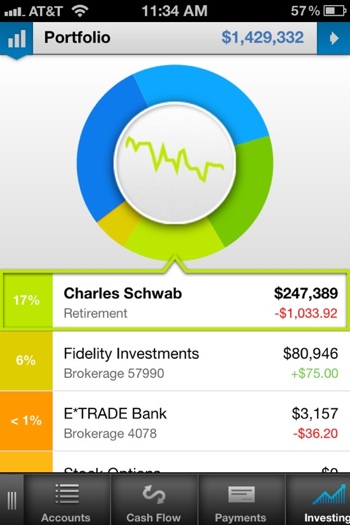Former PayPal and Intuit CEO Bill Harris builds a "high tech, high touch" app and service to manage all your money in a single place.

If you have multiple investment accounts (a mutual fund or two, a few 401Ks, and maybe even a stock purchase plan account), you know the misery of trying to keep track of what money you have where, much less your overall net worth.
And if you're a reasonably affluent person, say, anywhere between $100,000 to a few million dollars in assets, you know the equal misery of trying to figure out where to put all that money to best meet your financial goals.
Personal Capital, a startup cofounded by Bill Harris, the former CEO of Intuit and PayPal, has created a new service that's part "high tech," part "high touch" to tackle both parts of that equation.
On the tech side is an app that gathers all your financial information in a single place and not only lets you see everything all at once, but makes it easier to manage that money as well.
On the "touch" side are registered investment advisers, available by phone, that users can tap into for personalized advice and portfolio management.
"The main problem for most people is fragmentation," Harris tells Fast Company. "We help people take control of their finances."
 The app, which is available via web, iPad, and iPhone, is free because Personal Capital makes money off the investment services part of its business. The fee charged for those services varies depending on the size of the portfolio, but it's always less than 1 percent of the value of the user's portfolio, which is less than what many financial advisers charge.
The app, which is available via web, iPad, and iPhone, is free because Personal Capital makes money off the investment services part of its business. The fee charged for those services varies depending on the size of the portfolio, but it's always less than 1 percent of the value of the user's portfolio, which is less than what many financial advisers charge.The idea that people would trust their financial lives to a person they've never met face-to-face is revolutionary. Traditionally, the wealth management industry has been based on personal relationships, because of the value placed on trust.
Harris says he thinks that in a digital world where we manage more and more our lives remotely, people will be increasingly open to the Personal Capital approach, especially the company's target demographic--people with sufficient complexity in their financial lives to warrant individual attention but whose assets haven't been large enough to qualify for the wealth managers who cater to the super-rich.
"Not everyone will do it," Harris says, "but a large percentage of people are willing to try it."
The app itself will also probably help drive business to the investment services. It's designed to be a one-stop destination for viewing and managing your finances.
Users can sync up all their accounts, not just investments, but also bank accounts and credit cards as well. You can compare the performance of your portfolios to standard indexes and drill down on specific funds or even specific asset classes across funds. So if you want to take a look just at your ETFs or large cap stocks, for example, you can do that.
The tools deliver similar capabilities for your bank accounts and credit cards. You can review your expenditures by category and drill down, for example, to see why your grocery spending spiked at a particular time or where your income is coming from.
You can even use the app to move money between accounts or to pay bills and send money to other people.
Personal Capital is not the only player in this space, but none, even Mint, which focuses on people with less complex financial lives, are putting all the pieces together for higher net-worth individuals.
Harris says he was motivated to start Personal Capital after "20 years of building point solutions."
"I wanted this stuff myself," he says. "I want to get control of my money, to be able to see it and understand it all. And I want the ability to get help and advice and delegate much of the 'doing.'"
Harris may or may not be right about people being willing to trust their finances to people they've never met. But he strongly believes we're entering into a period of massive disruption for the financial industry, driven by a confluence of trends including the increased connectivity that is leading more and more consumers to expect to be able to manage their lives online (rather than in person) and the integration of cloud-based services and big data that give us better management tools and insight into questions like "How is my portfolio performing, really?"
"We're entering a period of 10 to 20 years of deconstruction," Harris says. "During that period, there will be the opportunity to build things from the ground up."
[Image: Flickr user @PeachySangria]
E.B. Boyd is FastCompany.com's Silicon Valley reporter. Twitter | Google+ | Email
DIGITAL JUICE
No comments:
Post a Comment
Thank's!